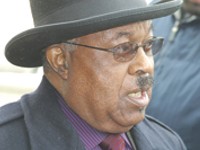Metro ink - 12.28.05
[
{
"name": "500x250 Ad",
"insertPoint": "5",
"component": "15667920",
"parentWrapperClass": "",
"requiredCountToDisplay": "1"
}
]
Zen machining
Mitch Cohen has an RIT textbook that is three decades old, which makes it several years younger than everything else in his studio.
"Most of this stuff is functional dinosaurs," Cohen says, as he hand-cranks a piece of paper through a large metal contraption. This, he says almost lovingly, is a "platen press." The two-foot-tall wheels churn, and Cohen explains how images used to be transferred to paper in the good old days.
For most people the thought of using a non-spell check, non-motor equipped letter press is about as close to practicing Zen as eating fried chicken, but for Cohen, the new director of the Printing and Book Arts (PABA) Center at the GeneseeCenter for the Arts & Education, the forgotten technique is "very soothing."
"You sort of become one with the machine when you're hand-feeding on a machine like this," he says.
Ironically, Cohen's grasp of the ancient trade makes him practically avant-garde in today's world. People drawn to the hand-hewn metal letters and pictures are often seeking solace from kitsch computer fonts and graphics. "It's big in California," Cohen says.
For the artistically disinclined --- a group to which Cohen pledges allegiance --- printmaking can also provide a creative vehicle for expression. "I like designing with type," Cohen says. "It's my artistic outlet." Not that he's quitting his day job --- yet. "Few people make money in this. In terms of production this isn't the way to go," he says.
It's a backwards sales pitch and a backwards art, really: upside down letters, sentences that read right to left and inverted, barely discernable images.
"Of course, it's all reversed," Cohen says. Oh, of course. I had forgotten. Up, down, right, left, it's all upturned like a dyslexic's window into reality. Or a child's.Maybe both. And somehow that's cool.
The PABACenter is the newest addition to the GeneseeCenter for the Arts & Education, 713 Monroe Avenue. For more information, including a class schedule in the book arts, call 244-9312 or go to www.geneseearts.org.
--- Sujata Gupta
Moving on in
As the Johnson era, like the year, was drawing to a close, Mayor-elect Bob Duffy was announcing his administrative team at almost daily press conferences last week.
In: former RGS Energy president Tom Richards, as corporation counsel; Charles Reaves, head of the Metro-Center YMCA, as parks and recreation commissioner; Julio Vazquez, president and CEO of the Ibero-American Action League, as community development commissioner; WXXI television VP Gary Walker, as communications director; Paul Holahan, currently Irondequoit public works commissioner, as environmental services commissioner; RIT's director of corporate relations, Steven Schwab, as deputy chief of staff; and School Board president Darryl Porter, as assistant to the mayor.
Switching teams: Porter, and Johnson's deputy mayor, Rick Hannon, who previously was assistant to the mayor. Hannon's joining the Rochester school district, where he'll be in charge of special projects, including facilities modernization.
Home run: The Richards appointment. Widely respected in the business and political community, Richards must be taking this on purely as a public service. He obviously doesn't need the grief he'll get as the city's attorney. Nor does this position carry the power of the job he once considered seeking: county executive.
Spots to watch: 1) The ferry corp's board. Four of its current members are leaving city government --- and the ferry board: City Councilmember Wade Norwood, Community Development Commissioner Linda Stango, Corporation Counsel Linda Kingsley, and Environmental Services Commissioner Ed Doherty. Since the mayor appoints some of the ferry board members, Duffy gets a chance to exert his influence.
2) The School Board. Darryl Porter won re-election in November, and he'll start the new year serving the first days of his new term on the board. But he'll almost immediately head to City Hall, and the School Board will appoint someone to fill his seat until a special election in November. Penfield teacher Jeff Henley, who ran unsuccessfully for the board in September's Democratic Primary, is one of several people under consideration for Porter's seat.
Ferrying forward
Mayor-elect Bob Duffy persuaded City Council to wait until he takes office to borrow $11.5 million for the ferry. At its meeting last week, Council approved borrowing the money, but made their action effective January 5. By then, Duffy and three new CityCouncilmembers will have been sworn in.
Duffy has said in the past that he's a strong supporter of the ferry. But he hasn't said whether he supports borrowing the additional money. He doesn't have much time to decide. It'll take 15 to 20 days for the city to get the money, and several crucial deadlines are coming up.
The next debt payment on the ferry is due in mid-February, for instance. The ferry corp's trying to line up marketing packages with Canadian tourism officials and with event promoters in the Rochester area; most of them are already wrapping up their budget for next year, and the city will have to put up money to get their participation.
And the ferry corp has a critical cash-flow problem. It's out of money, but expenses continue, even though the boat's docked until March.
Water savers
Earlier this month, after four years of work, a monumental agreement protecting Great Lakes water from withdrawals and diversions was signed with little fanfare.
The twin pacts, which together go by the unwieldy name the Great Lakes-St. Lawrence River Basin Water Resources Compact and Agreement, all but prohibit taking water out of the watershed, and sharply limit water diversions within the basin --- for activities like irrigation, for example.
The Great Lakes contain about 20 percent of the world's fresh water (including a hefty portion of Greater Rochester's public water supply), and all that water is increasingly attractive to other states or other nations. In fact, in 1998 Canadian authorities briefly gave a company the go-ahead to ship tankers of the water to Asia. That permission was quickly rescinded, but fears of a similar event prompted the governors of all eight Great Lakes states plus the premiers of Ontario and Quebec to band together and agree on limits. That resulted in a 2001 agreement known as the Great Lakes Charter Annex.
Since then, the Council of Great Lakes Governors has been working with everyone from environmental groups to farmers' advocates to hammer out the best way to implement that plan. The agreement they reached in mid-December amounts to the fine print of the 2001 agreement.
Environmentalists are hailing the pacts as a landmark victory in their fight to protect water in the basin. You can view the new documents on the Council's website: http://www.cglg.org/projects/water/annex2001Implementing.asp.
For past coverage of the agreements from City Newspaper, check out these stories:
"Great Lakes, cold feet: Ontario backs off water deal", December 1, 2004
"Water watch: striving to keep the Great Lakes ours,"July 28, 2004
"Waste management: Fighting to save the Great Lakes basin,"June 2, 2004.
Speaking of...
-

AIM Photonics names new Chair and awaits news about future funding
May 14, 2021 -

Feedback 2/17
Feb 17, 2016 -

After cryptic tweet, Bob Duffy clams up
Feb 9, 2016 - More »







